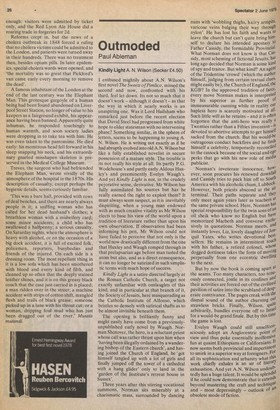Outmoded
Paul Ableman
Kindly Light A. N. Wilson (Secker £4.50)
I enthused mightily about A.N. Wilson's first novel The Sweets o fPimlico, missed the second and now, confronted with his third, feel let down. Its not so much that it doesn't work — although it doesn't — as that the way in which it nearly works is an unaspiring one. Was it Lord Hailsham who remarked just before the recent election that David Steel had progressed from white hope to elder statesman with no intervening phase? Something similar, in the sphere of letters, seems to be happening to young A. N. Wilson. He is writing not exactly as if he had abruptly evolved into old A.N. Wilson but like a fully established novelist in secure possession of a mature style. The trouble is its not really his style at all. Its partly P.G. Wode house's and partly early Aldous Huxley's and preeminently Evelyn Waugh's. And yet Kindly Light is not, in the crudely pejorative sense, derivative. Mr Wilson has fully assimilated his sources but has he really earned the right to exploit them? It must always seem suspect, as it is inevitably dispiriting, when a young man endowed with as much creative vitality as Mr Wilson elects to base his view of the world upon a tradition of literature rather than upon his own observation. If observation had been informing his pen, Mr Wilson could not have failed to perceive that not only is the world now drastically different from the one that Huxley and Waugh romped through in that prelapsarian age before man tasted the atom but also, and as a direct consequence, it can no longer be satirized in such simplistic terms with much hope of success.
Kindly Light is a satire directed largely at the Roman Catholic Church, a target not exactly unfamiliar with onslaughts of this kind, and in particular at that branch of it, the Society ofJesuits, here masquerading as the Catholic Institute of Alfonso, which bristles so densely with satirical shafts as to be almost invisible beneath them.
The opening is brilliantly funny and might easily have come from a previouslyunpublished early novel by Waugh. Norman Shotover, the hero, is a reluctant priest whose call was rather thrust upon him when 'having been illegally ordained by a wandering bishop of the Eastern church', and having joined the Church of England, he 'got himself tangled up with a lot of girls and finally jumped off the tower of a cathedral with a hang glider' only to land in the 'garden of the Institute's retreat house in Sussex'.
Three years after this stirring vocational summons, Norman sits miserably at a charismatic mass, surrounded by dancing nuns with 'wobbling thighs, hairy armpits, varicose veins bulging their way through nylon'. He has lost his faith and wants to leave the church but can't quite bring himself to declare his intended apostasy to Father Cassidy, the formidable Provincial. What Norman does not know is that Cassidy, most scheming of fictional Jesuits, has long ago decided that Norman is some kind of spy and traitor. But what kind? An agent of the Tridentine 'crowd' (which the author himself, judging from certain textual clues, might easily be), the Church of England, the KGB? In the approved tradition of farce, every move Norman makes is interpreted by his superior as further proof of immeasurable cunning while in reality oar hapless hero is scarcely motivated at all Such little will as he retains — and it is often forgotten that the anti-hero was really ! Twenties rather than a Fifties invention —is devoted to abortive attempts to get himself sacked from the church. But his would-he outrageous conduct backfires and he finds himself a celebrity, temporarily reconciled to the cassock because of the social and ego perks that go with his new role of media publicist.
Norman's inveterate innocence, how,; ever, soon procures his renewed down and Cassidy tries to pack him off to South America with his alcoholic chum, Lubbock.' However, both priests abscond at the alr terminal. Their paths separate and theY only meet again years later as teachers at the same private school. Here, Norman has special responsibility for the twin sons of au oil sheik who know no English but have memorized Macbeth and converse exclusively in quotations. Norman meets, arid instantly loves, Liz, lovely daughter of Jon" quil Yates, who writes devotional hest: sellers. He remains in intermittent toile!' with his father, a retired colonel, whose dogged dottiness takes the form of moving perpetually from one eccentric dwelling to the next.
But by now the book is coming apart at the seams. Too many characters, too tenuously connected, jostle in its confines and, their activities are forced out of the civilize° pavilion of satire into the scrubland of desperate contrivance. The pages creak with the dismal sound of the author churning out strawless bricks. Finally, Wilson, quite, arbitrarily, bundles everyone off to Israe' for a would-be grand finale. But by this time the game is lost.
Evelyn Waugh could still unselfcon', sciously adopt an Anglocentric point .01 view and thus poke essentially inoffens0 fun at quaint Ethiopians or Californians. It now seems both provincial and impertinent to smirk in a superior way at foreigners. Fo.r all its sophistication and urbanity what this work chiefly exhales is an air of literal exhaustion. And yet A,N. Wilson undouh., tedly has a huge talent. It would be splenchu if he could now demonstrate that it extends beyond mastering the craft and technique and — most depressingly — outlook of an obsolete mode of fiction.






































 Previous page
Previous page